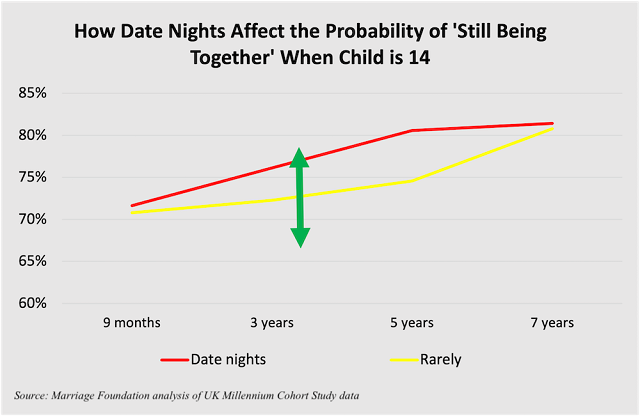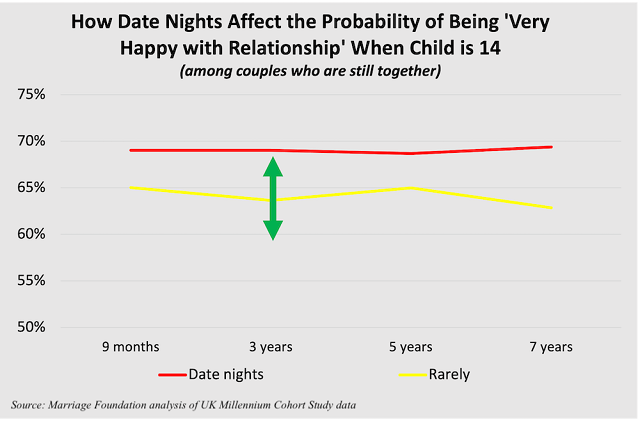Highlights
- Going on date nights when you have young children knocks 20% off the risk of splitting up. Post This
- Going on date nights when the children are babies or a little older increases the probability of being very satisfied with life later on. Post This
- Being intentional about your marriage when your children are still quite young pays real dividends in later years. Post This
One of the big problems with most national household surveys is that they don’t tell us what people are really like. They tell us about people’s backgrounds, how their situations change over time, and their opinions about things. But they don’t tell us much about how people behave towards one another, what their priorities are, or how they treat one another. Surveys are great at telling us what people look like on the outside but not so good at looking behind the curtain. It’s why there have been such big debates about marriage and divorce. Some people do well. Others not so. But why?
Like many who talk and write about marriage and relationships, I’ve long been a fan of “date nights.” Brad Wilcox, for example, writes glowingly about their benefits in his excellent new book Get Married. I have been married to my wife Kate for nearly 38 years. We have six young adult children. Since finding ourselves all too close to the brink of divorce some 30 years ago, we have made a point of taking time away from the children to spend time with one another. These date nights haven’t been especially frequent, and they haven’t been especially regular. But they have been a consistent feature of our married life since our near miss. Date nights are simply an evening that we put in the diary. I usually organize them because to Kate they can feel like one more thing to arrange. When our children were young, we booked babysitters or did a swap with other parents. We went out, sometimes to a restaurant, pub, or cinema, sometimes for a bike ride or walk. We chatted, and we reconnected as friends. Simple. We also made a point of spending at least one night away in a hotel every year. Sometimes, we were extravagant. Sometimes, we were cheapskates. Always it was fun. Even if we started off feeling closed and grumpy and reluctant, it never took long to make each other laugh and remember why we started the whole adventure together.
We put a few principles in place many years ago to make sure that our marriage was never again neglected because of the demands of work and parenting. Date nights are one of them.
Do date nights work for others? Emphatically yes! One of the questions asked in the UK Millennium Cohort Study, which follows thousands of families whose children were born in 2000-2002, is “how often do you go out together as a couple?” Even better, the question was asked when the children were aged nine months, three, five and seven years old. As part of my PhD research at the University of Bristol, I’ve been looking at how couples turn out by the time their children are 14. This means considering when and if couples married along the way and whether they stayed together, as well as some 27 other variables that described their background and situation soon after their child was born. For both parents, this includes things like age, ethnicity, education, income, employment, partnership history and time together, psychological well-being, as well as marital history. Adding date nights into the mix was therefore straightforward. We published a paper on this at Marriage Foundation earlier this month.

To be honest, I was surprised by the results. Net of all these other factors, going on date nights of any kind when the child was aged three or five significantly boosted the probability of staying together compared to couples who never went on date nights. Put another way, going on date nights when you have young children knocks 20% off the risk of splitting up.
Going on date nights when the children are babies or a little older doesn’t make you more likely to stay together. But it does increase the probability of being very satisfied with life later on. This even included couples who split up. Couples who stayed together were also more likely to be very happy with their relationship. This even took into account initial relationship happiness. It doesn’t seem to matter how disconnected you felt after the child was born. Date nights can make a difference.

I realize how awful this might sound if you are in a dark place as a young parent! Date nights are no guarantee. We’re talking about averages.
What’s going on here?
I said at the start that surveys tend not to pick up on how we treat one another. But it seems this measure of date nights might be doing exactly that. It certainly reflects my experience. I don’t think Kate and I got our act together just because of date nights. I don’t even think we would have split up or been less happy if we had not been on date nights. What I think date nights are picking up is our attitude of intentionality. Neither of us come from especially functional families. We’ve always wanted to do family life better for ourselves and for our children. So we put a few principles in place many years ago to make sure that our marriage was never again neglected because of the demands of work and parenting. Date nights are one of them. We did similar things to make sure our children were secure in their identity, as do many parents. This is about being intentional. In the language of commitment, it’s about being a “decider, not a slider.” I think that’s what this research on date nights shows.
Harry Benson is research director for Marriage Foundation UK and a PhD student of marriage at the University of Bristol.










